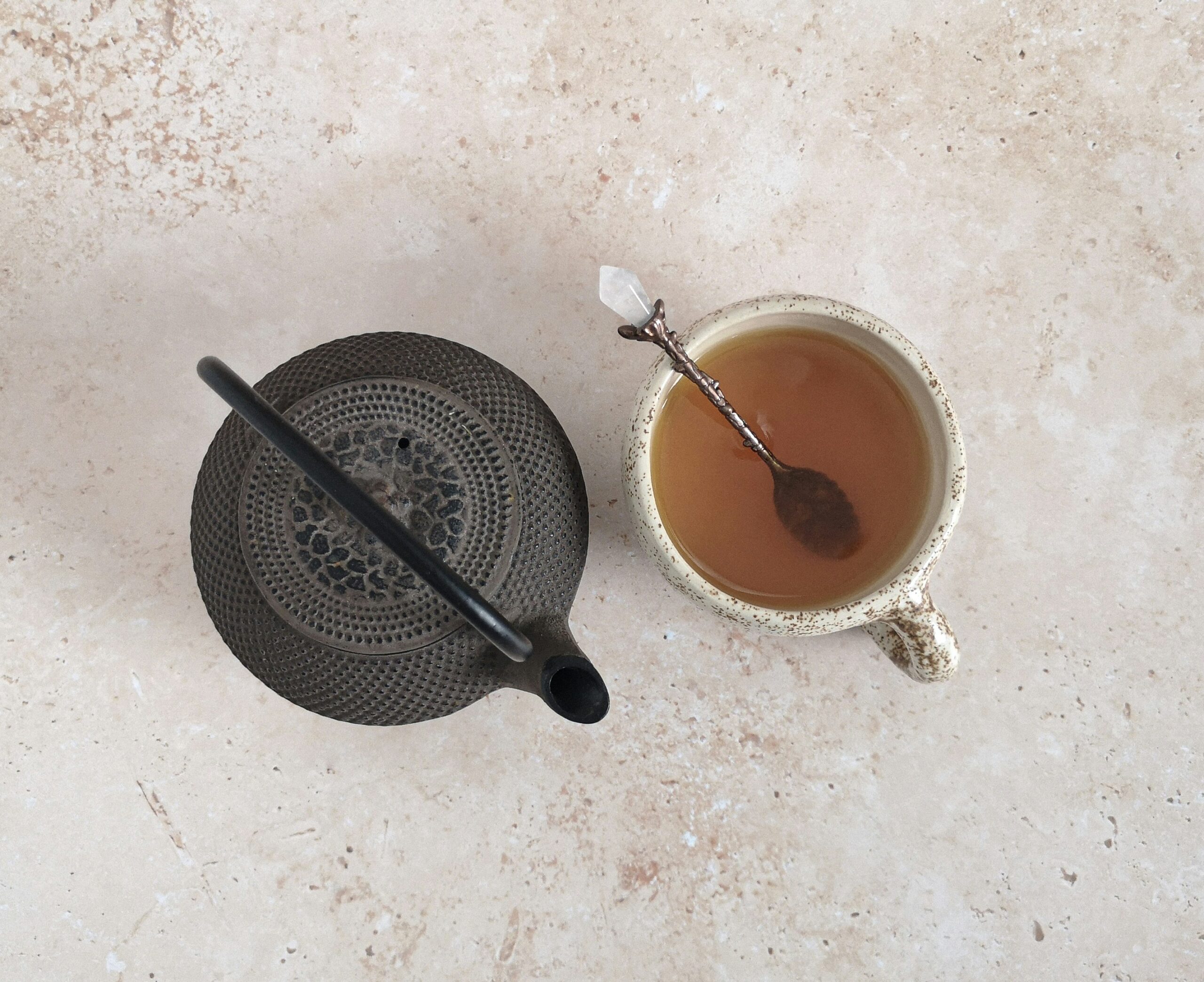Feeling mentally cloudy or unfocused can be frustrating, especially when you have a busy schedule. Brain fog, characterized by confusion and lack of concentration, can significantly impact your daily life. Using herbs like ginkgo biloba, rosemary, and ginseng can help improve mental clarity and boost cognitive function.

Ginkgo biloba is known for enhancing blood flow to the brain, while rosemary has been linked to better memory and concentration. Ginseng, another potent herb, can reduce fatigue and boost mental performance. These herbs have been used for generations to support mental health and clarity.
Including these herbs in your diet or as supplements might offer an effective way to clear brain fog and enhance your cognitive abilities. You can find these herbs in various forms, such as teas, capsules, or tinctures.
Key Takeaways
- Herbs like ginkgo biloba, rosemary, and ginseng can improve mental clarity.
- These herbs have been traditionally used to support cognitive function.
- Including them in your diet might help reduce brain fog and boost focus.
Understanding Brain Fog
Brain fog is a common issue affecting many people. It can significantly impact your ability to concentrate, remember things, and effectively manage day-to-day activities.
Causes of Brain Fog
Several factors can contribute to brain fog. Sleep deprivation is a major cause, as insufficient rest can hinder your cognitive abilities. Diet also plays a crucial role; poor nutrition can lead to fatigue and reduced mental clarity. Stress and hormonal imbalances are other significant contributors. For instance, high levels of stress hormones like cortisol can affect your focus and memory. Mental fatigue often results from prolonged periods of intense focus or information overload. Your lifestyle choices, such as lack of exercise and poor sleep hygiene, are additional factors that can lead to brain fog.
Impact on Daily Living
Brain fog can severely affect your daily life. At work, reduced focus and concentration can lower your work performance. You might find it hard to stay attentive during meetings or complete tasks efficiently. Forgetfulness can lead to missed deadlines or mistakes. Social interactions can also suffer; you may feel confused or distracted during conversations, which impacts your quality of life and social interactions. Over time, persistent brain fog can lead to increased stress and fatigue, making it even harder to manage daily responsibilities. Your overall well-being and sense of accomplishment can decline, leading to a negative cycle that’s hard to break.
Role of Diet in Cognitive Health
Your diet plays a crucial role in maintaining your cognitive health. Specific nutrients and foods can support brain function and help you stay sharp.
Nutritional Deficiencies and Brain Function
Omega-3 fatty acids are essential for brain health. You can find them in fatty fish like salmon and mackerel. These nutrients help improve brain cell communication, which boosts memory and mood.
Antioxidants in foods like berries and green tea protect your brain cells from damage. They reduce oxidative stress, which can harm neurons.
Iron is vital for maintaining healthy blood flow to your brain. You can get iron from lean meats and leafy greens. Good blood circulation ensures your brain gets the oxygen it needs.
Protein supports the repair and growth of brain cells. Eggs, nuts, and beans are great sources of protein for cognitive health.
Water is essential for brain function. Dehydration can lead to confusion and decreased alertness. Ensure you’re drinking enough water daily.
While whole foods such as fruits, vegetables, and grains support overall health, limiting sugar intake is also crucial. High sugar levels can lead to memory problems and impair cognitive function.
Eating a balanced diet rich in these nutrients will support your cognitive function and help reduce brain fog.
For more detailed information about the connection between diet and cognitive health, check the studies available on brain health.
Herbal Remedies for Enhanced Cognition
Using herbs can boost your brain health by reducing stress and protecting your brain cells. Some adaptogenic herbs help manage stress, while others provide antioxidant benefits to shield your brain.
Adaptogenic Herbs and Stress Relief
Adaptogenic herbs are known for helping your body cope with stress. One key herb is ashwagandha, which helps lower cortisol levels, the hormone responsible for stress. It can enhance your mood and cognitive function.
Another powerful adaptogen is rhodiola rosea, known for improving mental performance and reducing fatigue. Holy basil (tulsi) is also effective in managing stress and supporting overall brain health.
These herbs work by balancing hormone levels and protecting your brain from the negative effects of stress. You can find them in various forms, such as teas, capsules, or extracts.
Antioxidants and Neuroprotection
Antioxidants help protect your brain from oxidative stress, which can harm brain cells. Ginkgo biloba is a popular herb that improves blood flow to the brain and enhances memory. It’s rich in antioxidants and can help reduce brain fog.
Another herb to consider is lion’s mane, which has neuroprotective properties. It supports brain cell growth and improves cognitive function.
Curcumin, found in turmeric, is another powerful compound. It has strong antioxidant properties and can protect against brain inflammation. Regular use of these herbs can help maintain brain health and prevent cognitive decline.
Traditional Approaches to Mental Wellness
Ancient practices like Ayurveda and Traditional Chinese Medicine (TCM) offer numerous herbs and remedies for cognitive support. These traditions use natural methods to promote mental clarity and overall brain health.
Ayurveda and Cognition
Ayurveda, an ancient Indian system of medicine, emphasizes using herbs to balance the body’s energies. Bacopa Monnieri (Brahmi) is a well-known herb in Ayurveda for enhancing memory and reducing brain fog. Studies suggest it may improve cognitive function and reduce anxiety.
Ashwagandha is another popular Ayurvedic herb used to combat stress and improve mental clarity. It is known for its adaptogenic properties, which help your body manage stress more effectively, potentially leading to clearer thinking and better focus.
Gotu Kola is often used to improve memory and mental alertness. This herb is believed to have neuroprotective properties, aiding in overall cognitive health and reducing symptoms of mental fatigue.
Lion’s Mane, though not traditionally Ayurvedic, is gaining popularity for its ability to help with cognitive functions. This mushroom is believed to promote nerve growth and improve memory, making it a valuable addition to mental wellness routines.
TCM and Cognitive Support
Traditional Chinese Medicine (TCM) has long recognized the importance of herbs in maintaining mental health. Ginkgo Biloba is one of the oldest and most widely used herbs in TCM for brain health, known to improve blood circulation to the brain, thus enhancing focus and memory.
Ginseng, particularly Panax Ginseng, is prized in TCM for its ability to boost energy and mental performance. It is often used to combat cognitive decline and improve mental clarity, making it effective against brain fog.
Cordyceps is another powerful herb used in TCM. It is known for its ability to enhance stamina and reduce fatigue, which can indirectly support cognitive functions by improving overall energy levels.
TCM also includes practices like acupuncture, which can complement herbal treatments. Acupuncture is believed to balance the body’s energies, potentially improving mental clarity and reducing symptoms of cognitive decline.
RELATED: 6 mindfulness activities you need to add to your daily routine
RELATED: Improving Mental Health with Mindfulness Apps: Here are Three of the Best.
Scientific Evidence on Herbal Efficacy
Scientific research on herbs shows promising results for improving brain fog. Key studies highlight certain herbs like ginkgo biloba and bacopa monnieri for their positive effects on cognitive functions.
Examining the Research Base
Clinical trials and meta-analyses provide strong support for using herbs to combat brain fog. A notable study on ginkgo biloba showed improvements in memory and cognitive speed. The double-blind study included a sample size of 120 participants, demonstrating significant cognitive enhancements.
Another herb, bacopa monnieri, has been researched extensively for its effects on neurotransmitters. Clinical trials have shown it can reduce mental fatigue. One study involving 100 participants found increased serotonin levels and better memory retention.
A meta-analysis on various herbs, including rhodiola rosea, showed statistical significance in reducing brain fog symptoms. The research emphasized herbs’ role in enhancing mental clarity.
These findings suggest that herbs can serve as effective tools for improving cognitive function.
Lifestyle Modifications to Reduce Brain Fog
There are several lifestyle changes you can make to help reduce brain fog. These include regular exercise, improving sleep habits, and staying hydrated.
Exercise and Improved Blood Circulation
Regular exercise helps improve blood circulation, which can enhance brain health. Physical activities like jogging, swimming, or even brisk walking increase the flow of oxygen-rich blood to the brain.
This can boost your energy levels and help you think more clearly. Additionally, exercise releases endorphins, which can improve your mood and reduce stress.
Keeping stress in check is crucial, as chronic stress can contribute to brain fog. By incorporating regular physical activity into your routine, you can support both your cardiovascular health and mental well-being.
Top 6 Mental Exercises for Sharpening Cognition
Engaging in mental exercises can boost your brain function and help prevent memory loss. These activities stimulate neuroplasticity, the brain’s ability to form and reorganize synaptic connections.
#1 Crossword Puzzles and Sudoku Solving puzzles like crosswords and Sudoku can enhance your executive function. These puzzles challenge your problem-solving skills and improve your ability to think strategically.
#2 Reading and Writing Reading a variety of genres and writing regularly can keep your mind sharp. Both activities stimulate different parts of your brain and improve your comprehension and communication skills.
#3 Memory Games Games that require you to recall information, like matching pairs or sequence games, can help improve your memory. These activities strengthen the neural networks associated with memory.
#4 Learning a New Skill Whether it’s a musical instrument, a new language, or a craft, learning something new can significantly boost your cognitive abilities. It engages multiple brain areas and promotes neuroplasticity.
#5 Brain Training Apps Apps that offer brain training activities, like Lumosity or Peak, provide structured exercises designed to improve various cognitive functions. These apps adapt to your progress and keep you challenged.
#6 Meditation and Mindfulness Practicing meditation and mindfulness can improve attention and executive function. Regular meditation has been shown to enhance brain function and reduce stress, which can benefit overall cognition.
**
Incorporating these simple mental exercises into your daily routine can help keep your brain fit and functional.
Potential Side Effects and Interactions
When using herbs for brain fog, it’s crucial to consider potential side effects and interactions. These can include reactions with medications, allergic responses, and appropriate dosages.
Navigating Risk Factors
Medication Interactions: Some herbs can interact with medications, affecting their effectiveness or causing side effects. For instance, St. John’s Wort can interact with CNS drugs, leading to adverse outcomes. If you are on medication, consult your healthcare provider before adding herbal supplements.
Allergic Reactions: Herbal supplements can cause allergic reactions in some individuals. Symptoms can range from mild (like rashes) to severe (such as difficulty breathing). Be cautious if you have a history of allergies.
Recommended Dosages: Adhering to recommended dosages is essential. Overconsumption of herbs can lead to toxicity or other health issues. Always follow the dosage instructions on the product label or consult a healthcare professional.
Preexisting Conditions: Individuals with preexisting conditions should be particularly careful. Certain herbs may exacerbate these conditions. For example, ginkgo biloba can affect blood clotting, which might be risky for people with bleeding disorders.
Pregnancy: Pregnant women should exercise caution and consult healthcare providers before using herbal supplements. Some herbs can affect pregnancy outcomes or interact with prenatal vitamins.
By understanding potential risks, you can use herbs safely to manage brain fog.
Natural vs. Pharmaceutical Approaches
Effectiveness Comparison:
Natural remedies often include herbs like ginkgo biloba and rosemary. These herbs are known to improve memory and focus. On the other hand, pharmaceuticals, such as prescription stimulants, work quickly and are backed by clinical research for treating brain fog.
Cost-Benefit Analysis:
Natural herbs are usually more affordable. They can often be found in health food stores. Pharmaceuticals tend to be more expensive, especially without insurance coverage.
Availability:
Herbs such as ginseng and gotu kola are easily available without a prescription. You can buy them from local stores or online. In contrast, pharmaceuticals require a doctor’s prescription and a visit to the pharmacy.
Long-Term Use:
Using herbs for brain fog, like bacopa monnieri, is usually considered safe for long-term use with fewer side effects. Pharmaceuticals might have side effects with prolonged use, including dependency and health risks.
Targeting Dementia and Alzheimer’s Disease:
A natural approach involving herbs like turmeric and sage has shown promise in early studies for supporting brain health and potentially slowing the progression of dementia and Alzheimer’s disease. Pharmaceuticals like Donepezil are commonly prescribed for these conditions but often come with side effects.
Summary Table
| Criteria | Natural Approaches | Pharmaceutical Approaches |
|---|---|---|
| Effectiveness | Good for mild symptoms, need longer duration | Fast-acting, clinically proven for severe symptoms |
| Cost | Generally cheaper | More expensive, insurance-dependent |
| Availability | Easily accessible, no prescription needed | Requires prescription |
| Long-Term Use | Safer with fewer side effects | Risk of dependency and other health risks |
| Dementia/Alzheimer’s | Promising but early research | Established treatments with known efficacy |
Understanding the subtle differences between these approaches can help you make a more informed choice tailored to your needs.
Future of Cognitive Enhancement
Emerging research is continually expanding our understanding of brain health. Scientists are investigating new ways to boost cognitive function and address neurological disorders. One promising area is genetic factors. By understanding how genes influence the brain, personalized medicine can be developed to offer tailored treatments.
Innovative treatments are also being explored. These include both natural and lab-created nootropics. Herbs like bacopa and ginkgo are popular for their potential to improve memory and focus.
Personalized medicine is becoming more significant. Treatments are increasingly designed to fit an individual’s specific genetic makeup, lifestyle, and health needs. This approach aims to maximize the effectiveness of cognitive enhancement strategies.
You might also see advancements in neurotechnology. Devices that stimulate brain activity or monitor brain function in real-time are being developed. These tools could offer new ways to improve mental clarity and treat conditions like brain fog.
Neurological disorders such as Alzheimer’s and Parkinson’s are receiving attention. Scientists are looking at how existing and new treatments can help manage or slow the progression of these diseases.
Additionally, diet and lifestyle adjustments remain crucial. Incorporating antioxidant-rich foods, regular exercise, and stress management techniques can support overall brain health.
To stay updated, you might explore books like The Brain Fog Fix which provide practical advice grounded in current science.



Comments +